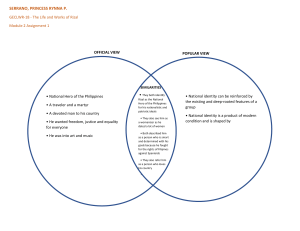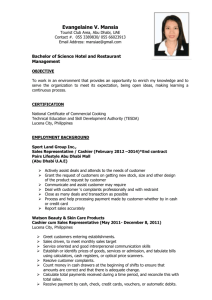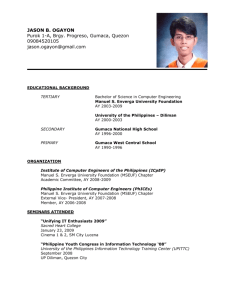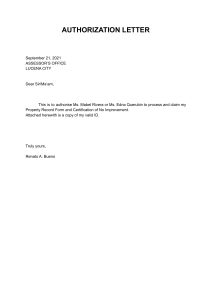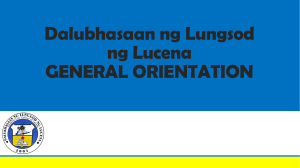1-19th-Century-Philippines-Prior-to-Rizals-Birth (2)(2)
advertisement
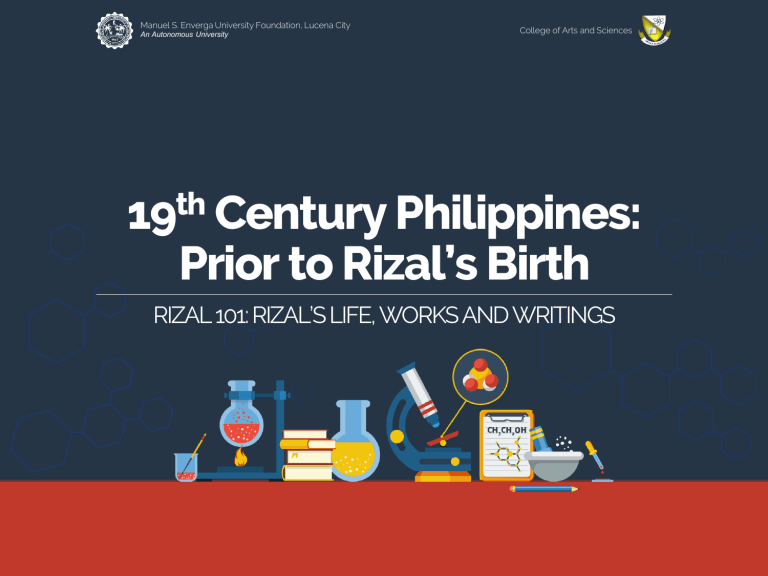
Manuel S. Enverga University Foundation, Lucena City An Autonomous University College of Arts and Sciences 19th Century Philippines: Prior to Rizal’s Birth RIZAL 101: RIZAL’S LIFE, WORKS AND WRITINGS Manuel S. Enverga University Foundation, Lucena City An Autonomous University Learning Outcomes • Improved awareness about the life, works, and writings of Jose Rizal and the course requirements • Improved ability to summarize the sociocultural, political, economic milieu before and during Dr. Jose Rizal’s time • Improved ability to summarize the sociocultural, political, and economic milieu before Dr. Jose Rizal’s time 19th Century Philippines: Prior to Rizal’s Birth RZ 101: Rizal’s Life, Works and Writings College of Arts and Sciences Manuel S. Enverga University Foundation, Lucena City An Autonomous University Learning Objective/s • To understand history as a discipline • To know the importance of history • To know the status of Philippines in the 19th century • To discuss the social, political, and economic status of the Philippines in the 19th century before the time of Dr. Jose Rizal 19th Century Philippines: Prior to Rizal’s Birth RZ 101: Rizal’s Life, Works and Writings College of Arts and Sciences Manuel S. Enverga University Foundation, Lucena City An Autonomous University College of Arts and Sciences HISTORY AS A DISCIPLINE 19th Century Philippines: Prior to Rizal’s Birth RZ 101: Rizal’s Life, Works, and Writings Manuel S. Enverga University Foundation, Lucena City An Autonomous University College of Arts and Sciences History as a Social Science • History a chronological record of significant events (such as those affecting a nation or institution) often including an explanation of their causes (MerriamWebster, 2020) a branch of knowledge that records and explains past events (MerriamWebster, 2020) 19th Century Philippines: Prior to Rizal’s Birth RZ 101: Rizal’s Life, Works and Writings Manuel S. Enverga University Foundation, Lucena City An Autonomous University History as a Social Science • Sources Primary Secondary Tertiary 19th Century Philippines: Prior to Rizal’s Birth RZ 101: Rizal’s Life, Works and Writings College of Arts and Sciences Manuel S. Enverga University Foundation, Lucena City An Autonomous University College of Arts and Sciences Primary Sources • are contemporaneous to the subject being studied • objects, letters, journal or newspapers • must originate from the time being studied to be accepted as a primary source, this can include copied images of an original document, or reprinted editions of a book • If a historian was studying Abraham Lincoln, diaries and letters written by Lincoln would be primary sources Manuel S. Enverga University Foundation, Lucena City An Autonomous University College of Arts and Sciences Secondary Sources • are nearly always textual: books or journals • A secondary source would be an article written about a primary source • To continue the example above, an essay or book written about Abraham Lincoln based on his diaries and letters would be a secondary source Manuel S. Enverga University Foundation, Lucena City An Autonomous University Tertiary Sources • are sources that rely on secondary sources for their information • include most school textbooks, essays written at school that cite textbooks and secondary sources • Books and essays that are historiographical in nature, so discuss the way in which history is presented, are tertiary sources College of Arts and Sciences Manuel S. Enverga University Foundation, Lucena City An Autonomous University College of Arts and Sciences Importance of Studying History • History promotes patriotism and enhances responsible citizenship • Learn important lessons • History helps us understand what informed the actions of those before us • History equips us with vital skills • History is fun Manuel S. Enverga University Foundation, Lucena City An Autonomous University College of Arts and Sciences Importance of Studying History • History is a good subject for career and professional development • It creates a sense of moral understanding • To find inspiration • Cultural consciousness and cross-cultural appreciation can be realized through the study of historical events • It provides information about genealogy Manuel S. Enverga University Foundation, Lucena City An Autonomous University College of Arts and Sciences Importance of Studying History • History makes us better citizens • Better society • To preserve important memories and events • To make the better world: • Many historical personalities are role models of many Manuel S. Enverga University Foundation, Lucena City An Autonomous University College of Arts and Sciences Philippine Political Structure before Rizal’s Time 19th Century Philippines: Prior to Rizal’s Birth RZ 101: Rizal’s Life, Works, and Writings Manuel S. Enverga University Foundation, Lucena City An Autonomous University College of Arts and Sciences Manuel S. Enverga University Foundation, Lucena City An Autonomous University College of Arts and Sciences The Political Structure • Spain established a centralized colonial government in the Philippines that was composed of a NATIONAL GOVERNMENT and a LOCAL GOVERNMENT that administered provinces, cities, towns, and municipalities. Manuel S. Enverga University Foundation, Lucena City An Autonomous University The Political Structure • National government • Maintained peace and order • Collected taxes • Built schools and other public works College of Arts and Sciences Manuel S. Enverga University Foundation, Lucena City An Autonomous University College of Arts and Sciences The National Government • The Governor General • The King’s representative and the highest-ranking official in the Philippines • Royal decrees and laws emanating from Spain were implemented in the Philippines • Had the power to appoint and dismiss public officials, except those personally chosen by the King • Supervised all government offices and the collection of taxes • Exercised certain legislative powers • Issued proclamations to facilitate the implementation of laws • Requirement: Must be a PENINSULARES or a SPANIARD BORN IN SPAIN Manuel S. Enverga University Foundation, Lucena City An Autonomous University College of Arts and Sciences The Provincial Government • Alcaldia – led by Alcalde Mayor • Governed the provinces that had been fully subjugated under SPANISH CONTROL ALREADY • They represented the Spanish King and the Governor-General • They managed the day-to-day operations of the provincial government • Implemented laws and supervised the collection of taxes Manuel S. Enverga University Foundation, Lucena City An Autonomous University College of Arts and Sciences The Provincial Government • Corregimiento – led by Corregidor • Governed the provinces that were not yet entirely under Spanish control. Manuel S. Enverga University Foundation, Lucena City An Autonomous University College of Arts and Sciences The Provincial Government • The ALCADIA and CORREGIMIENTO though were paid a small salary, enjoyed privileges such as: • Indulto de comercio – galleon trade Manuel S. Enverga University Foundation, Lucena City An Autonomous University College of Arts and Sciences The Municipal Government • Cabeza De Barangay/ Barrio Administrator/ Barangay Captain • Responsible for the peace and order of the barrio • Recruited men for public works • Qualifications: should be literate in Spanish, have good moral character and property Cabezas who served for 25 years were exempted from forced labor Manuel S. Enverga University Foundation, Lucena City An Autonomous University College of Arts and Sciences The City Government • Ayuntamiento – larger towns which became cities • Became a center of trade and industry • Has a city council called Cabildo • Cabildo is composed of: • • • • Alcalde (Mayor) Regidores (Councilors) Alguacil Mayor (Police Chief) Escribando (Secretary) Manuel S. Enverga University Foundation, Lucena City College of Arts and Sciences An Autonomous University Compare the powers of the Spanish Governor-General with those of the Powers of the President of the Philippines today Powers of the Spanish GovernorGeneral 1. 2. 3. Powers of the President of the Philippines 1. 2. 3. Manuel S. Enverga University Foundation, Lucena City An Autonomous University College of Arts and Sciences Briefly compare the administrative structure of the government during the Spanish rule with that of the present system of government Categories National Government Provincial Government Municipal Government City Government Government System during Spanish Time Present System of Government Manuel S. Enverga University Foundation, Lucena City An Autonomous University College of Arts and Sciences THE SOCIAL, POLITICAL AND ECONOMIC STATUS OF THE PHILIPPINES IN THE 19TH CENTURY BEFORE THE TIME OF DR. JOSE RIZAL Manuel S. Enverga University Foundation, Lucena City An Autonomous University College of Arts and Sciences The 19th century was also a time of change, the age of enlightenment, and is commonly depicted as the birth of modern life as well as massive changes in Europe, Spain and consequently in the Philippines. The 19th century in the Philippines as Rizal’s context are divided into three (3) aspects such as: 1. Economic Context 2. The Social Background 3. The Political Landscape Manuel S. Enverga University Foundation, Lucena City An Autonomous University College of Arts and Sciences Economic Context a) The End of Galleon Trade • Galleon trade started in 1565 to 1815, the Spanish government closed some parts of Manila to all countries except Mexico, thereby starts the birth of Manila – Acapulco Trade, known as the “Galleon Trade” lasted for 250 years, and trade were intercultural exchanges between Asia-Philippines, Spanish, America, Europe and Africa. Aside from the locals (Filipinos) were already trading with China, Japan, Siam (now Thailand), India, Cambodia, Borneo and Moluccas on September 14, 1815 Galleon Trade. Manuel S. Enverga University Foundation, Lucena City An Autonomous University College of Arts and Sciences Economic Context b) Opening of Suez Canal • Suez Canal, an artificial sea-level waterway in Egypt, connects the Mediterranean Sea to the Red Sea. Suez Canal was constructed under French diplomat, Ferdinand de Lesseps and was officially opened on November 17, 1869. The opening of Suez Canal became a huge advantage in commercial enterprises between Europe and East Asia. Manuel S. Enverga University Foundation, Lucena City An Autonomous University College of Arts and Sciences Economic Context c) Establish Monopolies in the Philippines • The main source of wealth during the post Galleon era in 1850, government, monopoly contracts for collection of different revenues and were opened to foreigner. The Chinese instantly took advantage of this commercial opportunity and thus for the rest of the 19th century. Manuel S. Enverga University Foundation, Lucena City An Autonomous University College of Arts and Sciences The Social Background The social picture of the 19th century was the use of a) education b) the rise of Chinese mestizo and c) the rise of Inquilinous. a. The coming of Spanish colonizer, schools were established and run by the catholic missionaries. The natives (Filipinos) were converts to Catholic faith and make them obedient to colonial government and the Catholic Church in the Philippines. King Philip II mandated Spanish authorities to educate the locals, teach them to read, write and learn Spanish. The first formal schools were the parochial schools. In 1863, a royal decree called for the establishment of public school system in the Philippines. Manuel S. Enverga University Foundation, Lucena City An Autonomous University College of Arts and Sciences The Social Background b. The Rise of Chinese Mestizo At the beginning of the 19th century, economic and political changes in Europe affects Spanish and consequently the Philippines. The elimination of the galleon trade, Manila became open almost without restriction by the mid-1830s. Economic progresses in the Philippines during the 19th century resulted the use of new breed of rich and influential Filipino middle class, the class composed of Spanish and Chinese mestizos ascended to position of power in the Philippine Society. Manuel S. Enverga University Foundation, Lucena City An Autonomous University College of Arts and Sciences The Social Background c. The Rise of the Inquilinos Contextually, the 19th century inquilino (tenant) system in the Philippines is better understood as a qualified system of tenancy or the right to use land in exchange for sent. The Elimination of the Galleon Trade and Opening of Suez Canal gave way to intensive rice cultivation and production of crossinquilinos paid or fixed rent and was determined by the size and quality of land being cultivated. Manuel S. Enverga University Foundation, Lucena City An Autonomous University College of Arts and Sciences The Political Landscape Under these political influencer are: a. Liberalism • is a worldview founded on ideas of freedom and equality. Political philosophies consider individual liberty and underscore individual rights and equality and opportunity. Liberalism in the Philippines was introduced and modelled in the Philippines was introduced and modelled by Governor – General Carlos Maria De La Torre, who held the position from 1869 to 1871, widely considered the most beloved Spanish governor assigned in the Philippines. Manuel S. Enverga University Foundation, Lucena City An Autonomous University College of Arts and Sciences The Political Landscape Under these political influencer are: b. The Impact of the Bourbon Reforms • the Spanish Bourbon King Philip V, advocated to reform and modify the Spanish empire. These policy changes as the Bourbon reforms endeavored to curtail contraband commerce, reclaim control over transatlantic trade, restrict the church power, reform state finances. Bourbon policy become more advantageous to the Philippines which was under Spain from 1565 to 1898. Manuel S. Enverga University Foundation, Lucena City An Autonomous University College of Arts and Sciences The Political Landscape Under these political influencer are: c. The Cadiz Constitution • Spain promulgated the Cadiz Constitution in March 1812. The Cadiz constitution was the first constitution in Europe to deal with national sovereignty. This constitution was very influential as liberal constitution which vested sovereignty in the people, recognized the equality of all men and the individual liberty of the citizen, and granted the right of suffrage. Manuel S. Enverga University Foundation, Lucena City An Autonomous University College of Arts and Sciences Sources: https://www.merriam-webster.com/dictionary/history https://classroom.synonym.com/three-types-of-history-sources12081403.html https://www.importantindia.com/23240/importance-of-history-in-ourlife/#:~:text=History%20is%20a%20good%20subject%20for%20career%20and, lawyers%20base%20their%20legal%20arguments%20on%20past%20cases.

